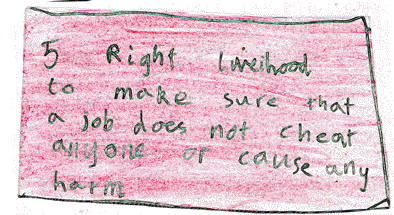
Right livelihood (samyag-ājīva / sammā-ājīva).
This means that practitioners ought not to engage in trades or occupations
which, either directly or indirectly, result in harm for other living beings.
In the Chinese and Pali Canon, it is explained thus:
And what is right
livelihood? There is the case where a disciple of the noble ones, having
abandoned dishonest livelihood, keeps his life going with right livelihood:
This is called right livelihood.
More concretely today interpretations include "work and
career need to be integrated into life as a Buddhist," it is also an ethical livelihood, "wealth obtained
through rightful means" (Bhikku Basnagoda Rahula) - that means being
honest and ethical in business dealings, not to cheat, lie or steal. As people are spending most of the time at work, it’s
important to assess how our work affects our mind and heart. So important
questions include "How can work become meaningful? How can it be a support
not a hindrance to spiritual practice — a place to deepen our awareness and
kindness?"

The five types of businesses that should not be undertaken:
2.
Business in human
beings: slave trading, prostitution, or the buying and selling of children or adults.
3.
Business in meat:
"meat" refers to the bodies of beings after they are killed. This
includes breeding animals for slaughter.
5.
Business in poison:
producing or trading in any kind of poison or a toxic product
designed to kill.
Samādhi
Samadhi is literally translated as "concentration", it
is achieved through training in the higher consciousness, which brings the calm
and collectedness needed to develop true wisdom by direct experience.

Right effort
Right effort (samyag-vyāyāma / sammā-vāyāma)
can also be translated as "right endeavor" or "right
diligence". In this factor, the practitioners should make a persisting
effort to abandon all the wrong and harmful thoughts, words, and deeds. The
practitioner should instead be persisting in giving rise to what would be good
and useful to themselves and others in their thoughts, words, and deeds,
without a thought for the difficulty or weariness involved. In the Chinese and
Pali Canon, it is explained thus:

And what, monks, is
right effort?
(i) There is the case where a monk generates desire, endeavors,
activates persistence, upholds and exerts his intent for the sake of the
non-arising of evil, unskillful qualities that have not yet arisen.
(ii) He generates desire, endeavors, activates persistence,
upholds and exerts his intent for the sake of the abandonment of evil,
unskillful qualities that have arisen.
(iii) He generates desire, endeavors, activates persistence,
upholds and exerts his intent for the sake of the arising of skillful qualities
that have not yet arisen.
(iv) He generates desire, endeavors, activates persistence,
upholds and exerts his intent for the maintenance, non-confusion, increase,
plenitude, development, and culmination of skillful qualities that have arisen:
This, monks, is called
right effort.
Although the above instruction is given to the male monastic
order, it is also meant for the female monastic order and can be practiced by
lay followers of both genders.
The above four phases of right effort mean to:
1.
Prevent the unwholesome
that has not yet arisen in oneself.
2.
Let go of the
unwholesome that has arisen in oneself.
3.
Bring up the wholesome
that has not yet arisen in oneself.
4.
Maintain the wholesome
that has arisen in oneself.
No comments:
Post a Comment